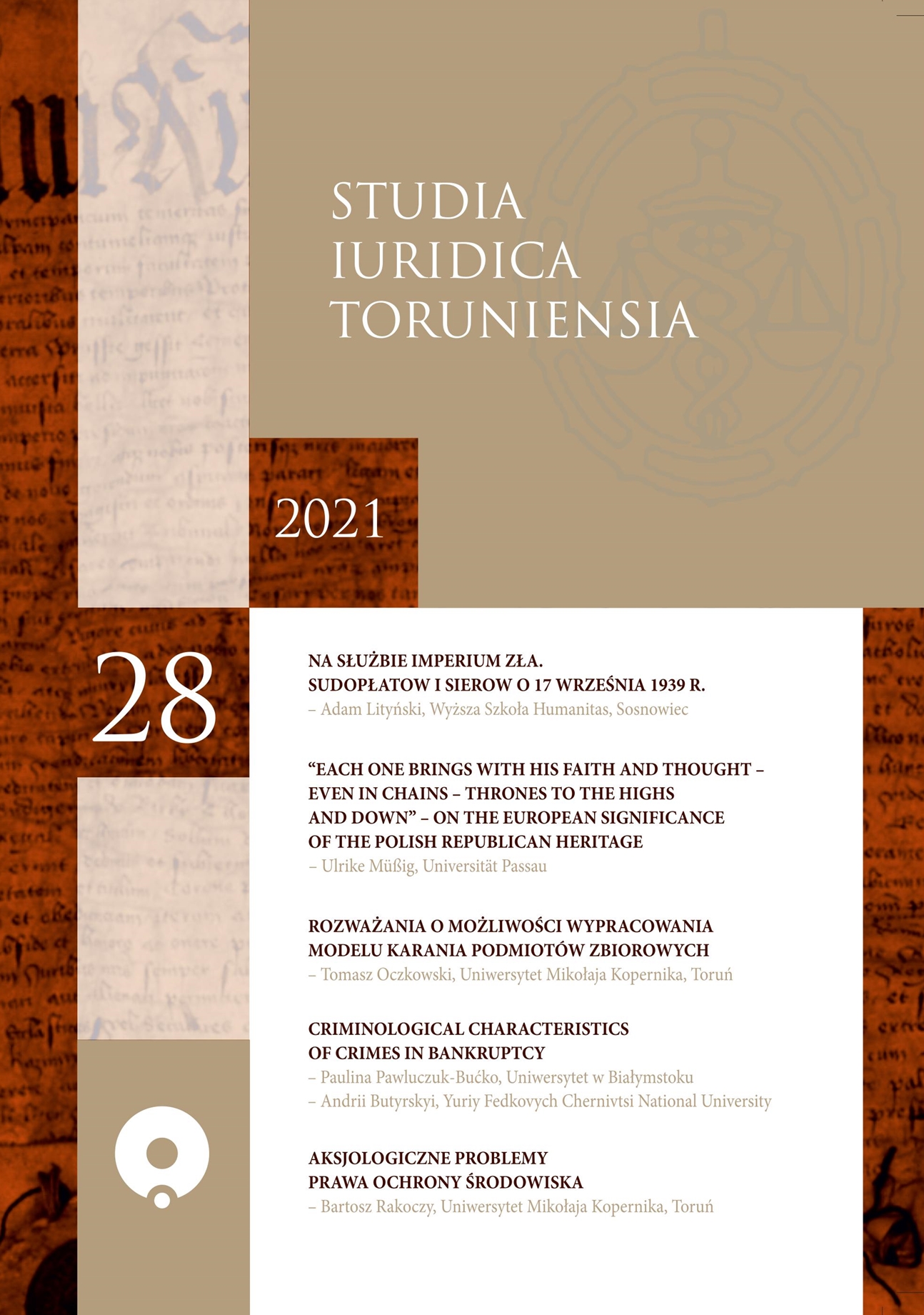“Each one brings with his faith and thought – even in chains – thrones to the highs and down” – on the European significance of the Polish republican heritage
DOI:
https://doi.org/10.12775/SIT.2021.010Keywords
republican dignity not to be mastered, republican self-rule, coincidence of civil and political rights, corporative sovereignty entrusted in the nobility in its entirety, republican continuities in the May ConstitutionAbstract
Constitutional history may be done on national or on comparative scale. If approached comparatively, it requires an external look to a historical legal system. This look, though, is the more accurate the more one considers the legal cultural spirit. As a German legal historian, it is decisive to distance myself from any Hegelian Volksgeist-thinking. Rather, my interest in the Polish republican tradition forging the national memory in the years of statelessness and imposed authoritarianism is guided by a Burckhardtian way. As he read the Civilisation of the Renaissance in Italy (1860) in terms of the rise of the individual, there seems to be a Polish legal culture in terms of a republican stimulus of “non-domination”. If this paper argues that Polish republicanism has a share in Poland’s vital and leading role in the fall of communism from 1989 onwards, it is not so naïve to assume a direct line from the late sixteenth and early seventeenth centuries, when nobility was acquiring real power at the expense of royal prerogatives, to the twentieth century. It is more like a visit to Monet’s Bassin aux nymphéas in the Parisian Musée Marmottan: Blossoms are placed on the canvas in thick strokes, merging colours into another. The water lilies are only recognizable, if you stand ba ck from the painting and admire the whole
picture. It is in this way that Polish Republicanism matters, not only forPoland, but also for Europe.
References
Adamus J., Monarchizm i republikanizm w syntezie dziejów Polski, Łódź 1961.
Butterwick R., The Polish-Lithuanian Commonwealth, 1733–1795: Light and Flame, New-Haven–London 2021.
Dabrowski P.M., Commemorations and the shaping of modern Poland Bloomington-Indianapolis 2004.
Fazal T.M., State death: the politics and geography of conquest, occupation, and annexation, Princeton 2011.
Grześkowiak-Krwawicz A., Anti-monarchism in Polish republicanism in the seventeenth and eighteenth centuries, in: Republicanism. A shared European Heritage, Vol. I (Republicanism and Constitutionalism in Early Modern Europe), ed. M. v. Gelderen, Q. Skinner, Cambridge 2002.
Grześkowiak-Krwawicz A., The Political discourse of the Polish-Lithuanian commonwealth, New York–London 2021.
Hartz L., The liberal tradition in America. An interpretation of American political thought since the revolution, Harcourt 1955.
Kasprowicz E.Ł., Konstytucja 3 Maja 1791 roku, z uwagami podawanemi jej twórcom w 1789 roku, Lipsk 1865.
Kołłątaj H., Uwagi nad pismem… Seweryna Rzewuskiego… o sukcesyi tronu w Polszcze rzecz krótka, Warszawa 1790.
Müßig U., Juridification by Constitution. National Sovereignty in Eighteenth and Nineteenth Century Europe, in: Reconsidering Constitutional Formation I National Sovereignty. A Comparative Analysis of the Juridification by Constitution, ed. U. Müßig, Cham 2016.
Müßig U., Jurisdiction, Political Authority, and Territories, in: The Oxford Handbook of European Legal History, eds. H. Pihlajamäki, M.D. Dubber, M. Godfrey, Oxford 2018.
Müßig U., Kopernik and ReConFort: A Copernican turn in comparative constitutional history, „Giornale di Storia Costituzionale” 2019, 37/I.
Müßig U., Reconsidering Constitutional Formation – Research challenges ofComparative Constitutional History, “Journal of Constitutional History” // “Giornale di Storia Costituzionale” 2014, 27.
Müßig U., Reconsidering Constitutional Formation. The Polish May Constitution 1791 as a Masterpiece of Constitutional Communication, “Czasopismo Prawno-Historyczne” 2015, 67.
Opaliński E., Civic Humanism and Republican Citizenship in the Polish Renaissance, in: Republicanism. As Shared European heritage, Vol. I (Republicanism and constitutionalism in early modern Europe), ed. M. v. Gelderen, Q. Skinner, Cambridge 2002.
Opaliński E., Kultura polityczna szlachty polskiej w latach 1587–1652, Warszawa 1995.
Orzechowski S., Wzór Korony Polskiej na cynku wystawiony, Kraków 1858.
Pasztor M., Hugo Kołłątaj na Sejmie Wielkim w latach 1791–1792, Warszawa 1991.
Pettit P., Two Republican Traditions, in: Republican Democracy, ed. A. Niederberger, P. Schink, Edinburgh 2013.
Pietrzyk-Reeves D., Polish Republican Discourse in the Sixteenth Century, Cambridge 2020.
Reinhard W., Geschichte der Staatsgewalt. Eine Vergleichende Verfassungsgeschichte Europas von den Anfängen bis zur Gegenwart, München 1999.
Rysiewicz M., Monarchia – lud – religia. Monarchizm konserwatywnych środowisk politycznych Wielkiej Emigracji w latach 1831–1848, Kraków 2015.
Rzewuski S., O sukcesyi tronu w Polszcze rzecz krótka, Kraków 1789.
Tarnowska A., The Sovereignty Issue in the Public Discussion in the Era of the Polish 3rd May Constitution (1788–1792), in: ReConsidering Constitutional Formation I: National Sovereignty, A Comparative Analysis of the Juridification by Constitution, ed. U. Müßig, Cham 2016.
Vogler G., Europas Aufbruch in die Neuzeit 1500–1650 (Handbuch der Geschichte Europas; 5), Stuttgart 2003.
Willoweit D., Seif (= Müßig) U. (eds.), Europäische Verfassungsgeschichte, München 2003.
Wyczański A., Szlachta Polska XVI wieku, Warszawa 2001.
Zamoyski A., Poland, A History, London 2009.
Zernack K., Polen in der Geschichte Preußens, in: Handbuch der preußischen Geschichte, Bd. II: Das 19. Jahrhundert und Große Themen der Geschichte Preußens, O. Büsch (Hrsg.), Berlin–New York 1992.
Zielińska Z., Republikanizm spod znaku buławy. Publicystyka Seweryna Rzewuskiego z lat 1788–1790, Warszawa 1991.
Downloads
Published
How to Cite
Issue
Section
License

This work is licensed under a Creative Commons Attribution-NoDerivatives 4.0 International License.
Stats
Number of views and downloads: 1893
Number of citations: 0



